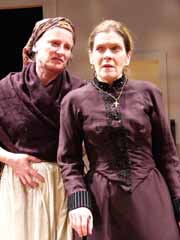
PAULANNE SIMMONS
There's No Place Like Home
 |
| Joanne Camp (left) as Poncia and Carol Schultz as Bernarda inThe Pearl Theatre Company's production of The House of Bernarda Alba byFederico García Lorca. Photo by Matthew Shane Coleman. |
"The House of Bernarda Alba"
Directed By Shepard Sobel
The Pearl Theatre Company
80 St. Marks Place
Jan. 8 through Feb. 13
$50 Fri. through Sun., $40 weekdays and Sat. matinees
(212) 598-9802 or visit www.TheaterMania.com
Reviewed by Paulanne Simmons Jan. 29, 2005
Federico Garcia Lorca wrote "The House of Bernarda Alba" in June 1936, just two months before he was killed by Franco's troops. It was thus the playwright's final work, considered by some to be one of his greatest masterpieces.
The play is on stage at the Pearl Theatre through Feb. 13, where director Shepard Sobel has been given it a regal and dignified treatment worthy of its place in history.
The stage is set by Takeshi Kata, who has designed a room composed of blank white walls and viewless windows. It is in this room that the recently widowed Bernarda (Carol Schultz) informs her five daughters that for the next eight years they will be sequestered in this house in mourning for their father.
In no position to exhibit any open defiance to their imperious mother, the girls nevertheless strain at the reins that bind them. But marriage is the only possible escape, and only the oldest (who has her own inheritance from a different father) has been able to find a suitable prospect.
Except for the antics of the house servants (the excellent Fulvia Vergel and Joannne Camp) and Bernarda's aged mother (Carmen de Lavallade) there is no letup in the passionate interactions of the repressed and angry young women whom Bernarda tries to control with an iron hand.
But Sobel tells this classic story of desire denied with a kind of ritual formality that makes Lorca's drama seem more symbolic than realistic. Indeed the actors often appear to expound rather than emote
Despite the date it was written, this tale of betrayal, rampant sexuality and a host of familial secrets seems a lot more like Racine than Tennessee Williams.[Simmons]
| museums | NYTW mail | recordings | coupons | publications | classified |